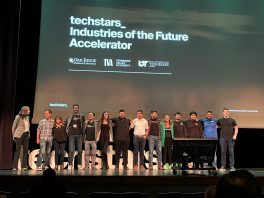
Inclement weather, evacuation after fire alarm don’t dampen enthusiasm during last Thursday’s celebration for local Techstars inaugural cohort
 By Tom Ballard, Chief Alliance Officer, PYA
By Tom Ballard, Chief Alliance Officer, PYA
Neither the inclement weather nor a 15-minute interruption caused by a fire alarm that required evacuating the Student Union at the University of Tennessee (UT), Knoxville minimized the celebration during Thursday evening’s “Demo Day” for the 10 participants in the inaugural cohort of the “Techstars Industries of the Future Accelerator.”
The recurring enthusiasm started when Techstars Managing Director Tricia Martinez took the stage at the beginning of the program and continued throughout the event as she introduced each of the 10 cohort members. She said something special and personal about each founder that makes them unique.
It was also evident in the genuine warmth that each of the cohort members exhibited for their colleagues as they made pitches on stage to wild cheering from the gallery and both earlier and later during networking opportunities. It was obvious in the pride that Randy Boyd, Jeff Lyash, and Thomas Zacharia – top executives at the three sponsoring organizations (UT, Tennessee Valley Authority{TVA}, and Oak Ridge National Laboratory {ORNL}) – had for the first year of the three-year initiative and their appreciation for the role that Martinez has played.
And the warm feelings reached a new level when two of the start-ups – FLUIX and Silvis Materials – announced that they would establish a presence in Knoxville going forward. That was something that many ecosystem builders hoped would happen with the Techstars program and, as we confirmed with several investors in the room, a 20 percent success rate would be great for an angel or venture fund.
 FLUIX, which is commercializing a technology to reduce heat in high-performance computing centers, will design and assemble its Turbulent Liquid Cooling devices here through partnerships with TGS Precision, a Lenoir City-based machining, fabrication and assembly company, and South Knoxville-based Advanced Computers. Fluix Founder Abhi Sastri (pictured right) told us he met the owner of TGS in church.
FLUIX, which is commercializing a technology to reduce heat in high-performance computing centers, will design and assemble its Turbulent Liquid Cooling devices here through partnerships with TGS Precision, a Lenoir City-based machining, fabrication and assembly company, and South Knoxville-based Advanced Computers. Fluix Founder Abhi Sastri (pictured right) told us he met the owner of TGS in church.
To use a baseball analogy, Sastri was the cleanup batter, albeit #10 rather than #4, and he brought a high level of energy to his pitch. “We have blown-up our vision during Techstars,” the animated and engaging resident of Orlando said. Noting that data centers will consume 20 percent of global power by 2040, Sastri said that the Fluix technology that reduces heat can increase the overall processing power of data centers, allowing a 100 percent increase in server density.
 Boulder, CO-based Silvis Materials is developing low cost, 100 percent bio-based materials for the $26 billion polymer emulsion market. “We have eight years to cut carbon emissions in half,” Chief Executive Officer (CEO) Patty Ferreira (pictured left) said. After meeting and working with Sheng Dai, Corporate Fellow and Section Head at ORNL, she announced that Silvis Materials would establish its research operations in Knoxville.
Boulder, CO-based Silvis Materials is developing low cost, 100 percent bio-based materials for the $26 billion polymer emulsion market. “We have eight years to cut carbon emissions in half,” Chief Executive Officer (CEO) Patty Ferreira (pictured left) said. After meeting and working with Sheng Dai, Corporate Fellow and Section Head at ORNL, she announced that Silvis Materials would establish its research operations in Knoxville.
“We can upend the plastics industry by using cellulose,” Ferreira added.
During a fireside chat with the sponsors, Martinez began the conversation by asking how they felt about the program after its inaugural year. “I could not be more excited,” TVA CEO Lyash said. UT President Boyd described the program as “incredibly successful,” while ORNL Director Zacharia said, “It’s been amazing to have these entrepreneurs in our community. You have already enriched the community.”
Looking to the conclusion of Cohort 3 when the initial commitment of the sponsors to Techstars will end, Martinez asked about what they hoped would be accomplished. “I hope we set a pattern for other companies that want to come here,” Boyd said. For Zacharia, it is about the region and how it embraces the program. “We could not do this without the community,” he said, adding, “There’s a tremendous opportunity to build on it but it starts with the community.”
Lyash reiterated what the three sponsors have said since they underwrote the Techstars assessment of the ecosystem that started in 2020. The “Big 3” have always worked together but are doing so in a much more impactful way today. “We can do better, not only collaborating with each other, but also with the community,” he said in picking-up on Zacharia’s point.
After evacuating the Student Union when the fire alarm sounded, the fireside chat resumed with Martinez asking one final question about key technology areas. Each panelist addressed it but with a consistent bold vision: innovation leadership for the nation and the world.
- For Lyash, it was for Eastern Tennessee to see itself as a true leader in innovation, not just in the lab but at scale.
- Boyd focused on one area: electric vehicles (EVs). “Tennessee will be the number one manufacturer of EVs in the country when (Ford’s) Blue Oval comes online,” he said. “It’s only right that East Tennessee be the EV leader, and it’s our fault if we are not.”
- Zacharia was the last panelist to speak and picked-up on Boyd’s point. “All transportation is going to be electric, and it’s going to be carbon free,” he said. “Tennessee can be a world leader in transportation,” but Zacharia noted the importance of having a trained workforce in transportation and other areas. “I’m really optimistic about the future,” he said.
 All took the stage at the end of “Demo Day” for a group photo (pictured here ) and a final acknowledgement of their time in Knoxville from the attendees.
All took the stage at the end of “Demo Day” for a group photo (pictured here ) and a final acknowledgement of their time in Knoxville from the attendees.
Besides FLUIX and Silvis Materials, the other eight companies that pitched included three that we have previously spotlighted in teknovation.biz and a fourth that will be spotlighted soon. They are:
- Augurisk (see teknovation.biz article here) that is focused on helping individuals assess societal, manmade, and climatological risks to property. “Every year, 40 million Americans move to a new home, and there was $60 billion in damage to homes (from those actions) in 2021,” CEO Mohamed Mezian said Thursday night. In addition to 10,000 users of its web-based product, the start-up is launching a new app named Vetterr.
- Be Global Safety (see teknovation.biz article here) that is an artificial intelligence (AI)-based start-up whose signature product offering is named ARVISTTM, an acronym that stands for “A Rather Very Intelligent Safety Technology.” ARVIST integrates seamlessly with other incident management software or ERP (Enterprise Resource Management) software to help with immediate and real-time identification of unsafe acts. There is also a predictive component to the software. “A safe workplace is a basic human right,” CEO Nilay Parikh told attendees.
- Skintelligent (look for teknovation.biz article publishing soon) that is a “skin tech” company that develops AI-based skin analysis software to assess skin based on a smart phone photo. Until recently the start-up has been focused on beauty care but has begun exploring the healthcare sector. To illustrate the market need, CEO Eleanor Jones told attendees that those looking for a new dermatologist in Knoxville have an average waiting time of four months, twice the national average. “We provide medical AI-grade software to analyze the skin,” she said.
- Spiky AI (see teknovation.biz article here) that is focused on the virtual meeting space and the level of engagement of individuals in meetings. As Co-Founder Furkan Eris noted in his pitch, “Companies don’t know how to manage employees in remote situations.” Spiky has executed partnerships with widely used virtual platforms like Cisco WebEx and Microsoft Teams.
The other cohort participants are:
- Armada IQ that has a long-term goal of being the standard intelligence platform for all hybrid autonomous domains. Its first product named Deep Scan is an AI-based safety analyst for the commercial trucking industry, and CEO Rick Chakra said the start-up has a pilot underway with a 350-vehicle trucking firm.
- Cypienta, one of the two international participants – it comes from Toronto – is described by CEO Ezz Tahoun as the future of cybersecurity. “Six trillion dollars is lost to cyber criminals annually, and that will double in the next three years,” he said. The company is building AI-based cyber security solutions and services that are easy to use, implement, and integrate.
- Grayscale AI, the other international participant that came from London, is focused on “enabling robots to see,” CEO Dragos Stanciu explained. “Robots don’t drive our cars or fly our planes,” he noted. “Why? Robots can’t see.” Using a technology called neuromorphic computing, Grayscale wants to employ the emerging technology to emulate how the human brain interacts with the world to deliver capabilities closer to human cognition. The start-up has four pilots underway in three industry sectors – automotive, aerospace, and defense.
- Modicus Prime was described by CEO Taylor Cartier as a self-service, AI-based tool for companies in the life science sector. Noting that contamination creates a $50 billion annual loss for pharmaceutical companies, the company has developed a product named mpVision as it focuses on three sectors: (1) internal manufacturing; (2) external manufacturing; and (3) contract research.
Like what you've read?
Forward to a friend!

